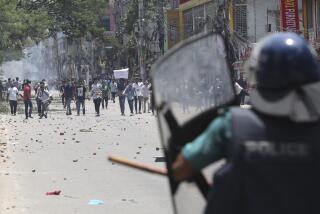Pakistan’s armed forces on alert as political crisis deepens
- Share via
ISLAMABAD, PAKISTAN — Pakistani authorities today placed opposition leader Nawaz Sharif under house arrest, a day after putting the armed forces on alert amid an escalating power struggle with former allies.
U.S. diplomatic efforts to defuse the political crisis intensified as the Pakistani government pledged anew to block a massive opposition rally in the capital on Monday. Secretary of State Hillary Rodham Clinton separately telephoned President Asif Ali Zardari and Sharif on Saturday, urging both sides to show restraint, according to spokesmen for the two camps. Zardari’s office said Clinton promised U.S. support for democracy in Pakistan.
Word of Sharif’s house arrest came from a spokesman, Pervez Rashid, who said hundreds of police surrounded the party leader’s residence at dawn, hours after he delivered a trademark fiery speech to supporters in Lahore. Pakistani television reports said Sharif’s politician brother, Shahbaz, had also been confined in the city of Rawalpindi, adjacent to Islamabad.
Pakistan returned to full civilian rule a year ago after nearly nine years under President Pervez Musharraf. But the victorious civilian opposition was quickly beset by infighting, which sharpened last month when the Supreme Court banned the Sharif brothers from elective office.
In a sign of the disarray within Zardari’s government, a key aide, Information Minister Sherry Rehman, was in seclusion after reports that she had tendered her resignation. Rehman was a close associate of Zardari’s late wife, ex-Prime Minister Benazir Bhutto.
Many of Bhutto’s friends and backers have distanced themselves from the actions of the government, which in recent days has arrested opponents and placed restrictions on political rallies. Zardari took over leadership of Bhutto’s Pakistan People’s Party after she was assassinated in December 2007, and he became president six months ago.
The renewed tumult has raised concern in Washington that Pakistan’s already fitful efforts to confront Islamic militants will be sidelined by the power struggle. The Obama administration is also keeping a wary eye on the seeming ascendancy of Sharif, who has less of a pro-Western bent than Zardari, as well as tighter links with Islamist parties.
An angry backlash against the Supreme Court ruling by supporters of the popular Sharif coincided with plans by a nationwide lawyers movement to stage protests demanding the reinstatement of Chief Justice Iftikhar Mohammed Chaudhry, who was fired by Musharraf. Now the two causes have in effect merged.
Most of the dozens of judges fired by Musharraf have been returned to the bench, and Zardari promised to reinstate the remainder but has not done so. The president is widely believed to fear that Chaudhry would reinstate corruption cases against him.
Zardari has also delayed giving up extraordinary powers that Musharraf accorded himself as president, including the ability to dissolve parliament.
In an apparent overture to the Sharif camp, the government said late Saturday that it would file a petition for a court review of the ruling on the brothers’ eligibility to hold office. Many of Sharif’s backers blamed Zardari for engineering the original high court ruling -- a charge the president and his aides heatedly deny.
Zardari has said he wants a negotiated settlement to the crisis. But sentiment on both sides appeared to be hardening. The decision to place the military on alert served mainly to galvanize protesters, who said they would find ways to reach Islamabad despite blockades on major routes.
Rehman Malik, the government’s senior law enforcement official, has said the restrictions were prompted by fear of a terrorist attack. Organizers scoffed at that.
In the capital, the mood was jittery. Police spot-checked vehicles heading into the city, and large shipping containers were pulled into place to block access to Constitution Avenue, which is lined with government buildings.
Much of the unrest was centered in Lahore, the Sharifs’ power base and a center of the lawyers movement, which was key in driving Musharraf from office. Violence is seen as likely if the lawyers try to leave en masse for Islamabad from Lahore and the security forces move to stop them.
--
More to Read
Sign up for Essential California
The most important California stories and recommendations in your inbox every morning.
You may occasionally receive promotional content from the Los Angeles Times.













